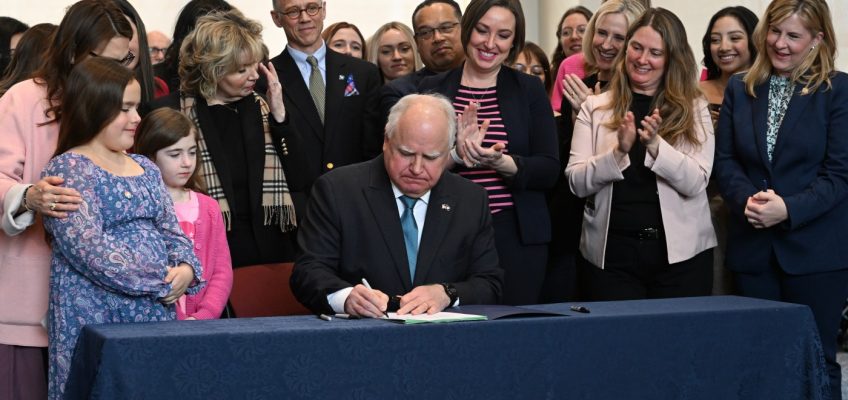During Tuesday night’s presidential debate, former President Donald Trump used claims about Minnesota abortion laws to rail against Vice President Kamala Harris and running mate Gov. Tim Walz’s record on the issue.
Asked by ABC News moderator Linsey Davis why he should be trusted on the issue of abortion rights after appointing justices to the Supreme Court who overturned Roe v. Wade, Trump accused Walz of having an extreme stance on abortion.
“Her vice presidential pick says abortion in the ninth month is absolutely fine,” Trump said. “He also says execution after birth, it’s execution, no longer abortion, because the baby is born, is OK. And that’s not OK with me.”
Davis immediately noted there is nowhere in the U.S. where it is legal to kill babies after they are born. And though Walz has never specifically expressed approval for abortion late in pregnancy, as Trump seemed to imply, Walz did sign a bill removing viability restrictions from Minnesota abortion law in 2023.
The Democratic-Farmer-Labor governor approved that change as part of a broader health budget bill that also eliminated other abortion restrictions including a 24-hour wait period, parental notification requirement for minors, and a requirement for abortions to be performed in a hospital after the first trimester.
A top priority for DFLers after the 2022 overturning of federal abortion protections from Roe was to bolster existing protections in Minnesota. Early in 2023, Walz signed into law a bill enshrining the right to abortion into state law and later signed off on the health bill with the other statutory tweaks.
The bills mostly bolstered protections already set up by past court rulings, including the 1995 Minnesota Supreme Court decision Doe v. Gomez, which protected the right to an abortion and prevented the state from blocking tax dollars for abortion.
Abortion rights were protected, and the viability restriction and others were already unenforceable due to past court decisions, but advocates wanted the language removed to bring more clarity to state abortion law. They argue abortions late in pregnancy are extremely rare and only done in extreme circumstances.
Public health data show late-term abortions are extremely rare in Minnesota and across the U.S., and almost never happen in the final months of pregnancy. The vast majority happen early in pregnancy. Nationally, more than 93% occur at or before the 13th week, according to the Centers for Disease Control and Prevention.
Of the 12,175 abortions performed in Minnesota in 2022, two happened between weeks 25 and 30 of pregnancy, according to an annual report from the Minnesota Department of Health. Some abortions have happened at week 31 or later – 11 between 2002 and 2022, state data show.
Under Minnesota’s old viability standard, whose enforceability was up for question after a 1976 federal court decision striking it down, a mother could only get an abortion after viability if it threatened her life or health.
Viability was not specifically defined in the law, though in medicine it’s typically set at 24 weeks — the sixth month of pregnancy.
Minnesota is one of several states, including Vermont and Oregon, that don’t have any restrictions on abortion tied to when a pregnancy started. Other states where abortion is still legal, such as New York and Pennsylvania, allow elective abortion up to 24 weeks.
Related Articles
What to know about fracking, false claims and other climate issues mentioned during the debate
St. Paul teachers union urges ‘No’ vote against property tax-funded childcare subsidies on St. Paul ballot
An Ohio city reshaped by Haitian immigrants lands in an unwelcome spotlight
For Harris and Trump, facial expressions did much of the talking during presidential debate
Donald Trump faces his own debate fallout just months after benefiting from Joe Biden’s


Leave a Reply